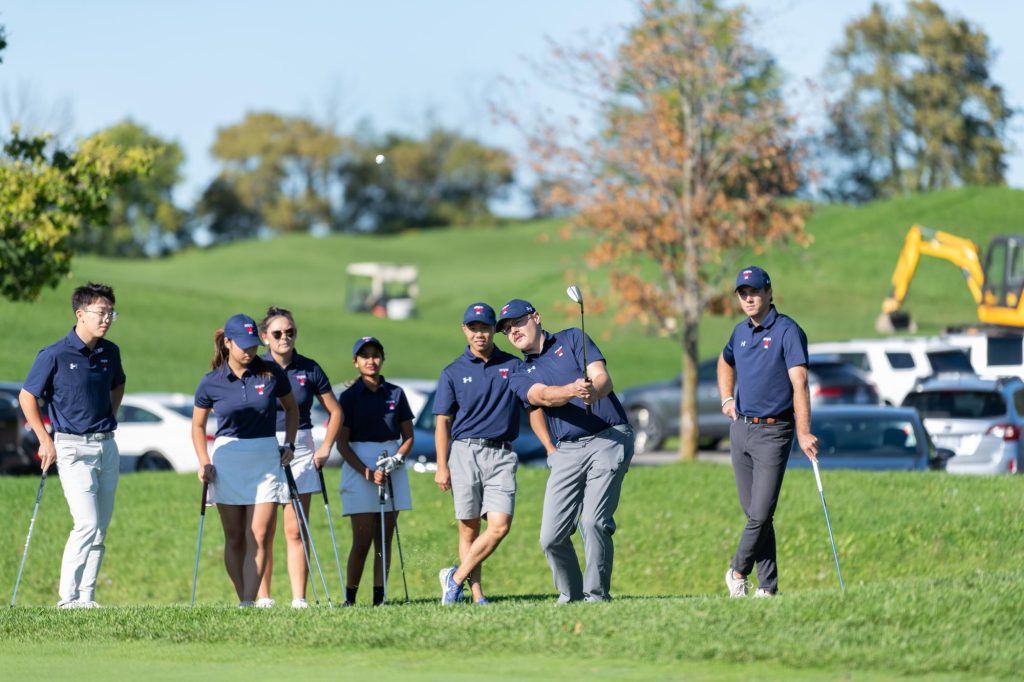
Imagine a world where you’re in your car, moving along the highway as you head into work. Now imagine, while you are making your commute, your vehicle is driving you there without your hands on the wheel or your foot on the accelerator. How would the public react to this futuristic sounding concept? What planning needs to be done for it to become a reality? It’s questions and thoughts like those that have helped drive Varsity Blues veteran golfer, Brenden Lavoie’s career aspirations.
Having already completed a bachelor of applied science in civil engineering, and now in his first year of his masters’ studies in the same field, Lavoie has long been enamoured with the intricacies that makes current-day cities operate, while also imagining how different city operations may look in the future. Originally planning on becoming an architect, the Albuquerque, New Mexico native ultimately found himself wanting to be involved in the transportation world.
“After coming to U of T, I was fascinated by the complex nature of transportation, specifically with the intricacies and uncertainty of peoples’ behavior,” Lavoie said. “Besides just designing and building our roads, transportation engineers have to consider a variety of other aspects too, such as politics, economics, accessibility, equality, etc. that is not present in many other engineering fields.”
“I love learning about cities, what makes them run, how they were built, etc. and transportation is a fundamental part of that.”

Going beyond the intrigue of the physical construction involved in transportation engineering, there is also a human aspect to it as well, that caught Lavoie’s attention.
“I also realized that by focusing on transportation, I could learn how people think and make decisions,” he said. “For example, should I take the subway or drive to work? There are a number of different factors that go into that decision, such as where you live, your income, age etc. and I find it interesting trying to consider all of that to try to predict how people are going to react.”
Trying to understand how one person to the next is going to react to anything can often be a difficult situation. However, Lavoie is taking that challenge to the next level with his thesis that he currently working on.
“My thesis looks to better understand how people would respond to autonomous vehicles, specifically, if and how their decision-making process would change with this new technology,” he said. “Will people travel farther if they can watch a movie as they drive? If so, will that attract more people to personal vehicles and add congestion? These are all questions that I am looking to answer and only happen because people are unpredictable.”
Taking a deep dive into a concept that some people think is just on the horizon, while others believe it to be very far-fetched, Lavoie is leaving no stone unturned when addressing the possibility of driverless vehicles.
“In the long term, perhaps decades from now, there might not be any normal vehicles on the road anymore,” Lavoie said. “There is a chance that all our vehicles will have no steering wheel; since, the technology will have progressed so far, it might be determined that driving yourself is significantly more dangerous than having the car drive for you.”

Should we wind up going down a road of autonomous vehicles, the Varsity Blues golfer feels there could be plenty of benefits for the general public.
“Maybe you can take your morning meeting in the car on your way to work since you no longer need to watch the road,” Lavoie said. “Once you arrive at work, perhaps you send your vehicle out to give rides to other people instead of parking, allowing you to make money while you sit at your desk.”
“Transporting goods will be a lot easier too, since several trucks can just follow almost bumper to bumper to each other on the highway, essentially operating as an autonomous train. Since vehicles will no longer need as much space while driving, the roads would be able to fit more cars on the road, potentially improving congestion.”
As great, or even frightening, as all of that may sound depending on your personal feelings towards the idea, there is still plenty that needs to be done before we see the 401 or the Gardiner Expressway full of independently thinking vehicles.
“Besides the advancement in technology itself, the government needs to develop a number of policies to avoid significant obstacles for the technology,” said Lavoie. “For example, if two autonomous vehicles get into a crash, who is at fault when no one was driving? The car owners? The car manufacturer? If the technology is extremely successful and attracts a lot of people to it, would the number of cars on the road increase, worsening congestion?”
“These are all extremely difficult questions, but ones that need to be solved if we are to have driverless vehicles on the road, and I am excited to be a part of that.”
Although Lavoie for now, is focused on completing his masters and learning more about how to make present day transportation and smooth and seamless as possible, there is no doubt, he will always have one eye towards the future and all of its incredible possibilities.
“In the short term, I am pursuing [my masters] to provide me with a solid foundation from which I can become the best engineer that I can,” he said. “In the long term, I hope to lead a team of engineers and planners to design the cities of tomorrow.”
This story was originally posted on the University of Toronto Varsity Blues website, February 3, 2022, as part of their Student-Athlete Stories series highlighting a U of T student-athlete and their academic pursuits. Each of the featured students achieved first class honours with an AGPA of at least 3.50 in the previous academic year.
